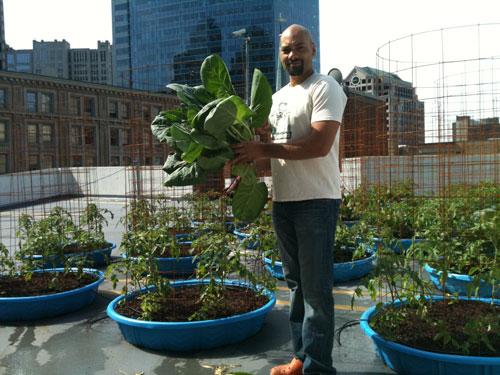Think there’s only one right way to farm in Boston? Think again! Here at GCG, we’ve found a system that works best for us but the urban farmer has an endless amount of options to customize their garden.
Installing the garden: what kind of bed will work for you?
When installing your garden you have several options to choose from: a traditional in-ground bed, a raised bed, or a container. It's important to take into consideration light, space, financial resources, and how much time you will have to tend your garden when choosing your bed type.
1. In-ground beds. These can be the cheapest option if you have the space for one and the soil is of moderate to high quality (hyperlink here to the soil test GCG page). Make sure that all parts of the bed are easily accessible and that they have a defined border.
2. Raised beds. We use raised beds because they are well suited for the urban environments we place them in; you can install one on virtually any flat surface, the soil won’t easily compact so plants can take root, they are impermanent and can be relocated, you are guaranteed good quality soil, and they can be more aesthetically pleasing than a traditional bed. You can even learn how to build them yourself in our book, The Urban Bounty.
3. Containers. Containers are the most versatile, coming in an endless variety of shapes and sizes, (we use kiddie pools at our b.good rooftop garden!) and they offer the most mobility. They can be placed in small patches of sunlight but they are the most high maintenance on this list because they often dry out too quickly or don’t drain at all! Be careful of the containers you choose, you want them to be easy to move even when fully saturated and you want them to be deep enough for what you want to grow.

Planning your garden:
Now that you know what kind of bed you’re going to plant in, you need to decide what you’re going to plant and how you’re going to plant it.
Why use seeds?
Seeds are a great option for plants such as lettuce, carrots, beets, or radishes that mature quickly or root deeply but starts can be worth it for longer-maturing plants such as tomatoes. When planting from seed, you have a much larger pool of varieties to choose from which can be handy if you’re looking for specific traits. They are also a cheaper option in the event that things don’t go as planned! GCG keeps it local and gets seeds from Johnny's Selected Seeds in Maine.
Why use starts?
For the novice farmer, plant starts are an excellent way to ensure that your young seedlings are healthy and have a high chance of survival. The threat of frost is still present in a New England spring and by having a few extra weeks of TLC in a greenhouse, those starts have well established roots and a higher chance of surviving transplant shock in the field. They also allow for a quicker and larger harvest. You can get starts beginning in April and May from local farms and nurseries (we get ours from certified organic Red Fire Farm).
Make sure to register for the Urban Farming Course March 21-23 to learn more about all the options for your own urban farm!



